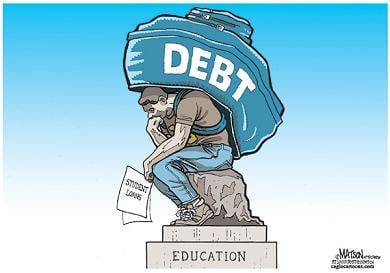Loan Sharks and Financial Terrorism: The Wonga Payday Lending Experiment

This business has been too focused on growth and cared more about the loan outcome than the customer outcome. Andy Haste, Wonga Chairman, The Guardian, Oct 16, 2014.
Keeping people poor in a world of seedy abandonment. Borrowing at phenomenal rates. Loan sharks running wild, dressed by the language of assistance and salvation. All of this should be the stuff to be binned and repelled by governments, but in an age when governments forfeit, rather than affirm responsibility in the face of the economy, the phenomenon of Wonga, a deferred deposit loan operator, has come to thrive. Private indebtedness has become both a condition and a lifestyle.
The names of such companies as Wonga suggests something benign, a sort of gentle helper in the world of tightened finance. You need cash. You need it quickly. Get the money, but then repay it at phenomenally high rates of interest. If you can’t make the payments by each payday, then you can be re-issued with a new round of finance for the debt. The circle closes, and is never opened. Goods can be repossessed. Property is surrendered. A loan of $200 easily multiplies to returns of $2000 for the lending company. (Wonga’s own rates can be up to 5,853 per cent a year.)
As the Australian Securities and Investments Commission cautions individuals, “The best way to stay out of debt is not to get a loan. Think about whether you really need the money right now, whether there are any other options, and whether a small amount loan is the right credit product for you.”[1] Steven M. Graves of California State University, Northridge draws up a depressing picture. “Growing disparities in the type of and accessibility to credit in the inner city has generated calls for greater regulation to curb practices by payday lenders that critics claim disproportionately affect poor and minority customers.”[2]
It should not be surprising that this fiendish financial product is not new. Alan Bond, convicted for Australia’s biggest corporate fraud, was one who did enjoy the business of pay-day lending. In Britain and the United States, it took off, a rogue model of obtaining profits that sent financiers courting those at the bottom of the economic food chain.
It even got the Archbishop of Canterbury, Justin Welby, worried. So much so, in fact, that he has a proposal: supporting credit co-ops, effectively credit unions that will act as a buffer against the loan shark model.[3] In Welby’s words, they will be “both engaged in their communities and are much more professional – and people have got to know about them.”
Welby, however, has another reason. Wonga has become a problem for his own organisation. The Church of England’s pension fund has found its money invested via a North American venture capital firm in Wonga’s own reserves. Ethical uprightness has, as a result, been undercut. “It shouldn’t happen, it’s very embarrassing, but these things do happen and we have to find out why and make sure it doesn’t happen again.”[4]
Wonga, which has been termed a “payday lender”, has written off the debts of 330,000 borrowers this month who were more than 30 days in arrears. The value of that comes down to an eye goggling £220m. Additionally, 45,000 customers in arrears will not be chased up for interest owing. The company is in retreat in the face of its own practices which have managed to lure individuals into the debt cycle in the name of innovative “business models”. Perhaps it is only fitting that it should have a new chairman by the name of Andy Haste, whose surname does not augur well for the company’s practices.
In a desperate attempt to salvage an already sunk reputation, the company has also appointed debt management executive Paul Miles as the new chief financial officer. He knows the right things to say, hoping to put “good governance and superior operating processes at the heart of everything Wonga does”.[5]
This could either be startlingly simple, or monumentally difficult, given the way Wonga has been operating. Hectoring customers under false names claiming to represent fictitious legal companies is not perhaps a “superior operating process” by any stretch of the imagination, but it must have been fun for the employees of the company whose names were actually used.
Sensitivities (because even financial markets can be sensitive) exist towards any move that could reduce the interest on the lending system, to make it more accessible without necessarily being more punitive. This might be due to the mania associated with the bubble of the housing market, something that has become a deity to worship rather than dethrone. As financial reporter Max Keiser notes, this disease can be attributed to the Thatcher period, as if we had not already noted it, when all Britons became housing speculators.[6]
The latest write-offs on the part of Wonga, and the keen manoeuvring to adjust its top staff, have been deemed apologies of purpose. They still want to operate, and have suddenly decided to come clean with a modern, revised conscience. Such a self-discovery, however, is pure illusion. The vital issue there is less to placate the customer than to placate the regulator.
That will not impress the Archbishop of Canterbury, who has made it clear to Wonga’s founder Errol Damelin that he hopes to “compete” the likes of Wonga “out of existence”. Fourteen states in the US have moved to ban payday lenders. Some Australian states have set limits on the maximum annual percentage rate.[7]
With the emergence of new digital market models, be it through Bitcoin, crowsourced funding, and such creations as Metrobank, new financial imperatives continue to operate.[8] But any regulator with teeth will have to consider halting the relentless march of the debt inducing machine that is the payday lender.
Dr. Binoy Kampmark was a Commonwealth Scholar at Selwyn College, Cambridge. He lectures at RMIT University, Melbourne. Email: [email protected]
Notes

